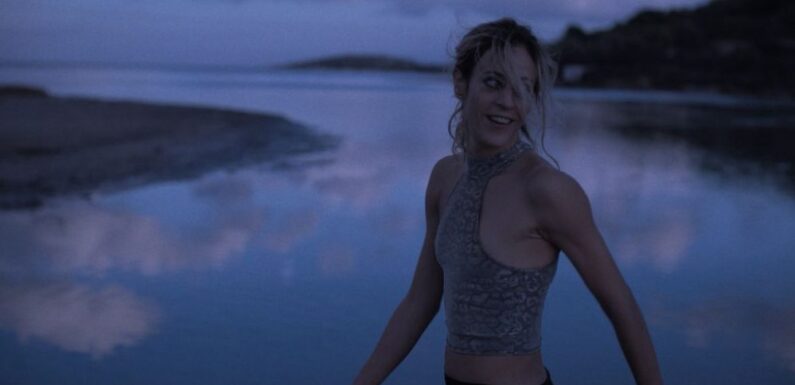
The Greek hotel where Sofia Exarchou’s jittery, melancholic “Animal” takes place doesn’t seem to be anyone’s first-choice holiday destination. The beach is gritty rather than golden. The skies are low and gray. The guests are older couples and noisy families — pragmatic souls seeking a couple of weeks of undemanding pleasure on a budget that doesn’t stretch to luxury. Setting foot inside the Hotel Mirage, a “White Lotus” guest would turn on her heel so abruptly she’d be in danger of breaking a Manolo.
But so much for the guests, who come and go. The unromanced gaze of Monika Lenczewska’s mobile, handheld camera is firmly fixed on the seasonal entertainment staff. Shacking up in tatty digs on the premises, the men and women who provide daily diversions for the all-inclusive package tourists have the self-organizing camaraderie of a circus troupe. They practise their dance routines and recycle their spangly costumes in the morning, run poolside bingo games and aqua-aerobics sessions by day, then in the evening put on low-rent cabaret shows. Nothing too raunchy or risqué, but a little friendly fake flirtation with the holidaymakers is expected.
Later still, they head downtown, where the dancers moonlight in local clubs on a casual basis, flinging down shots and partaking as much in the foam-flecked hedonism as the tourists, before maybe hooking up, then stumbling home at first light to do it all over again. It’s a lifestyle that’s tenable, and maybe even enjoyable, for a season or two in your twenties, but dancer Kalia (a riveting, Locarno Best Performance-winning Dimitra Vlagopoulou) is back for her ninth year running, and the strain is beginning to show. “Don’t forget the smile!” she reminds her younger counterparts as she teaches them that evening’s twerking, Zumba-style choreography. Her own rarely falters, but also rarely reaches her eyes.
Exarchou, in her second film after 2016’s “Park” which also starred Vlagopoulou, is fascinated by Kalia’s physicality, not in a prurient way, but rather as a vehicle to show the beginning of the body’s betrayal, in bruises that don’t heal as quickly as they used to, and straggling, too-often-dyed hair that needs to be bulked up with cheap extensions. Lean and wiry, Kalia is only a modestly talented performer (which still makes her the de facto queen of the Hotel Mirage’s motley crew), but she loves what she does. Indeed, however tacky the routines or cheesy the music, there is a sincerity in the troupe’s commitment to performing that is endearing, and makes all the more palpable Kalia’s dismay at the idea that it might soon have to end.
She is friendly with her colleagues, having an on-off fling with emcee Simos (Ahilleas Hariskos) and even taking greenhorn new arrival Eva (Flomaria Papadaki) under her wing. But it’s a bittersweet relationship. Eva is like Kalia herself, just a few crucial years ago, when this lifestyle was actually fun, and not just the constant, exhausting performance of fun. When Kalia slips at the club one night and injures her leg, she simply self-medicates with alcohol (and, gruesomely, a stapler) and binds it up under sparkly leggings to dance again the following evening. Don’t forget the smile.
The nerviness of the camera, contrasted with the languid pace of Dragos Apetri’s editing — arguably too languid in a midsection that could use some of Kalia’s self-disciplined toning — creates a formal tension that reflects the way Kalia’s life is passing, in moments she tries to lose herself in forever, while the weeks go by in an instant. Although, especially in the Kalia-Eva relationship, there are shades of “Hustlers” or “Burlesque” or even “Showgirls,” Kalia is at an in-between stage, aging out of ingenue status, but having too little to show for her years of experience to comfortably age into the mentor role. In a way, she’s closer in kinship to Marisa Tomei’s character in “The Wrestler” — a woman who relies on her body for her work suddenly facing the fact of her body’s unreliability. A woman whose only real antagonists are her faltering self-image, and time itself.
All the while there’s the sense that if Kalia could just drink enough, or dance enough, she could forget what she’s seen in the mirror in the daytime, stave off the decline and everything would be okay again, like the way Wile E. Coyote could make it to the other side of the canyon if only he could forget he had ever looked down. Vlagopoulou plays these glimpses of Kalia’s self-awareness and her tremendous sadness so well, culminating in the single most tragedy-tinged karaoke rendition of “Yes Sir, I Can Boogie” you will ever see. It’s a terrifically brittle ending to a film about brittle endings, and the way even those who can boogie-woogie all night long, always have to face the dawn.
Read More About:
Source: Read Full Article